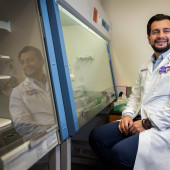Latest Releases
Find our latest releases below. After searching, you can view the most recent releases by clearing the search.
Browse experts on:

Rye pollen’s cancer-fighting structure revealed for first time
January 21, 2026
Chemists determined the 3D structure of the bioactive molecules in rye pollen, which slow tumor growth in animal models of cancer. With new blueprint, researchers could develop strategies for cancer treatment.
Northwestern law professors available on upcoming SCOTUS hearings on Trump v. Lisa Cook
January 20, 2026
The U.S. Supreme Court will hear oral arguments on Wednesday in another case regarding the president’s power to remove the members of independent agencies in the federal government.
* Media Advisory
* Media Advisory
Hidden heart-care gaps among Asian American patients
January 14, 2026
Northwestern researchers found that when Asian American heart failure patients are separated by ethnicity, rather than grouped together as “Asian,” important differences in care emerge across groups including Filipino, Vietnamese, Chinese, Asian Indian, Korean and Japanese patients.
* Media Advisory
* Media Advisory

More people are living 5 years after cancer diagnosis
January 13, 2026
Northwestern University oncologists discuss the release of the American Cancer Society’s 2026 statistics report, which shows that, for the first time, 70% of people diagnosed with cancer in the U.S. survive at least five years.
* Media Advisory
* Media Advisory

Northwestern’s MLK commemoration to reflect on the practice and possibilities of ‘Beloved Community’
January 12, 2026
Northwestern University’s annual commemoration of the life and legacy of Dr. Martin Luther King Jr. will pay tribute to King’s vision for a “Beloved Community” with events and projects planned throughout the month. All events are free, and several are open to the public. The programming kicks off Sunday, Jan. 18 at 2 p.m. with the MLK candlelight vigil.
Northwestern law professor available on upcoming SCOTUS hearings on trans athletes
January 12, 2026
The U.S. Supreme Court will hear two major cases on Tuesday that may determine the future of trans people in high school and college-organized sports.
* Media Advisory
* Media Advisory

When it comes to health care, how can AI help — or hurt — patients?
January 9, 2026
Northwestern University AI-in-clinical-medicine expert Dr. David Liebovitz can speak to media about the pros and cons of the new ChatGPT Health platform.
* Media Advisory
* Media Advisory

Control valve discovered in gut’s plumbing system
January 9, 2026
Discovery reveals a new drug binding site that could enable more precise treatments for digestive disorders.

Gender stereotypes reflect the division of labor between women and men across nations
January 7, 2026
Researchers at Northwestern University and the University of Bern in Switzerland have conducted the first cross-temporal, multinational study to compare views of gender using data collected 30 years apart.

Erik Luijten named new Northwestern provost
January 7, 2026
Erik Luijten, Associate Dean for Research and Doctoral Education in Northwestern’s McCormick School of Engineering, has been named the University’s next provost, Interim President Henry Bienen announced today.